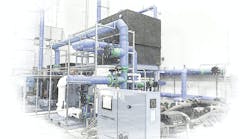The city of Oshkosh, Wis., will have to significantly reduce the amount of phosphorus discharged from its wastewater treatment plant under the terms of its new discharge permit, issued by the U.S. Environmental Protection Agency (EPA) and the Wisconsin Department of Natural Resources.
Regulators required the city of Oshkosh to cut the amount of phosphorus released from the current maximum level of one milligram per liter to 0.04 milligrams per liter by 2022, the Northwestern website reported. Initial estimates reveal that the city may have to spend about $39 million on new equipment to upgrade the wastewater treatment plant so that it can meet the limit in the new permit.
Although phosphorus is a common chemical in the environment, excess levels of phosphorus may lead to contamination. Phosphorus pollution causes enormous blooms of algae, which interfere with the natural waterway ecosystems and can be toxic. High concentration of phosphorus can impact the quality of drinking water by changing its taste and adding a specific odor. All these factors have led federal and state regulators to focus on reduction of phosphorus discharge across the United States.
According to Steve Brand, manager of Oshkosh's wastewater treatment plant, currently the city discharges amounts of phosphorus below the maximum allowed. The actual discharge ranges between 0.4 to 0.75 milligrams per liter, still much higher than the new target. Keeping the phosphorus level at the low level stated at the permit would require the construction of a new effluent filtration system that would remove phosphorus from wastewater before it gets discharged into local waterways.
Brand explained that the city was currently looking into the options available to comply with the new requirement but said the new filtration system would cost as much as $39 million. This is almost twice the amount that Oshkosh needs to rebuild its central garage and a third more than it originally cost to build the whole water treatment facility more than 20 years ago, he explained.
RELATED: EPA orders Minnesota to introduce tougher wastewater regulations
Meanwhile, Oshkosh city manager Mark Rohloff has asked a team of attorneys to review the city's options in trying to reduce the expected costs for complying with the new regulations. Rohloff stated that a large proportion of the phosphorus levels could be attributed to local agriculture activity and this factor should be taken into account by the EPA and the state's Department of Natural Resources.
City officials knew that the new permit would require lower maximum levels of phosphorus discharge but had hoped that the change would not be as dramatic. However, the proximity of Lake Winnebago to the city — just a mile and a half away — led to the tight restrictions.
The Department of Natural Resources' wastewater permit drafter Richard Sachs explained that the present state of Lake Winnebago was a cause for concern, as it was "phosphorus impaired." The new limit does not apply to Oshkosh alone; it is a reflection of the state's intention to introduce very tight discharge levels across all Wisconsin municipalities over the next few years, he noted.



